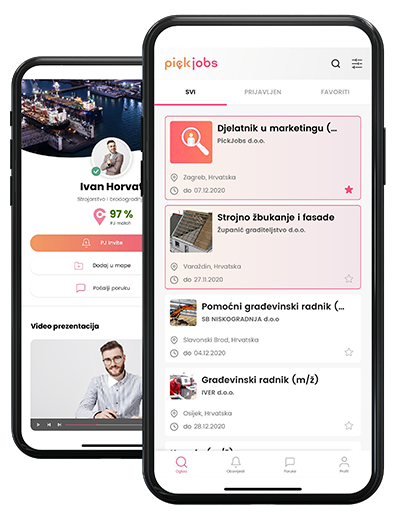Changing a job certainly belongs to the category of more difficult life changes. You are used to a certain routine, colleagues, the way things are done and what is expected of you, but the time has come for changes.
No change in life is easy, but some are harder than others. Changing a job certainly belongs to the category of more difficult life changes. You are used to a certain routine, colleagues, the way things are done and what is expected of you, but the time has come for changes. How to manage when changing jobs?
Top tips for changing jobs
If you understand this change as a new life challenge, an opportunity to develop and progress, we believe that it will help you to make those first days in a new environment as pleasant as possible. There are several things you can do yourself to make this period as painless as possible.
Try not to worry too much. The first day at work is always a stressful situation, because it is necessary to immediately understand the organization of the work and the characteristics of the company, and to remember the names of colleagues. Just try to concentrate. Carry a notebook with you and mark the details.
Before starting work, ask about what is expected of you and what the organizational climate is like. If possible, try to find out as much detail as possible about the organization to help you sort out your expectations. Be punctual! Your daily routine is clearly indicated in the employment contract. Most likely, you will soon notice that not all employees follow the accepted routine. Someone will come later and leave earlier, but if something is allowed to the old employees, it does not necessarily mean that it will be allowed to the newcomer, i.e. you.
Find out what the dress code is in the company you are coming to and be sure to follow it. Whatever style of clothing you prefer, you should follow the accepted rules of the dress code at work. If you dress differently than the situation calls for, you will feel uncomfortable. Pay attention to how your colleagues are dressed.
Come to work a few minutes early and with a few sentences about yourself prepared in advance to make it easier to introduce yourself even if you are nervous.
Arrange with your supervisor to introduce you to his employees on the first day or to delegate this task to someone who can do it on his behalf. There is a high probability that other employees will perceive you much more seriously in such a situation.
Ask someone to give you a brief introduction to the company's organization, to note who the key people are for each area and briefly their responsibilities, so that in the future you will know how to contact the right person if needed. Try to determine who you can turn to for help in the near future.
Think positive. There is a reason why they chose you out of all the candidates. Your job is to make the company even more successful, so focus on your goals from day one and try to find a way to be as productive as possible.
From day one, try to build good relationships with colleagues. At times it may seem tiring and difficult, but in the long run, creating good relationships with colleagues is good for everyone involved. Be kind and friendly! Take an interest in the jobs of your colleagues! Don't overdo it here and don't push yourself. Rejoice in the successes of your colleagues and empathize with their
failures. Do not show personal dislikes and anger! If you don't like someone, don't show it. In addition, do not burden employees with stories about their problems and troubles.
Use feedback! You should not start communication with your boss by solving conflict situations. After a while, depending on the length of your probationary period, ask your boss if he is satisfied with the results of your work. Ask if he sees flaws or has a comment. Don't be afraid of these questions. The boss will understand that you are interested in further work in his company and adequately perceive criticism.
Don't try to be perfect all at once! Slowly. During the trial period, you are not expected to produce great results. Everyone understands that a beginner must get comfortable and understand the specifics of the work in order to avoid mistakes.
The first day at work brings a lot of experiences and new impressions. In a short time, you must have time not only to understand the work, but also to get to know the employees and gain their sympathy. The main thing is not to panic in case of difficulties and perceive criticism objectively. It is worth noting that the first day of work of a new employee is a turning point, but far from decisive. Even if everything went smoothly, you still have a long adjustment period.

 Croatia
Croatia Bosnia and Herzegovina
Bosnia and Herzegovina Serbia
Serbia Crna Gora
Crna Gora North Macedonia
North Macedonia Ukraine
Ukraine Albania
Albania Kosovo
Kosovo Austria
Austria Deutschland
Deutschland Switzerland
Switzerland









